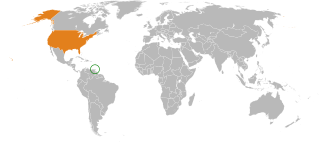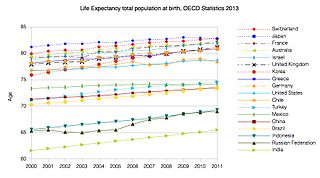Related Research Articles
Trinidad and Tobago, a country that relies heavily on industrialisation and tourism, has various transport systems.

Port of Spain, officially the City of Port of Spain, is the capital of Trinidad and Tobago and the third largest municipality, after Chaguanas and San Fernando. The city has a municipal population of 37,074, an urban population of 81,142 and a transient daily population of 250,000. It is located on the Gulf of Paria, on the northwest coast of the island of Trinidad and is part of a larger conurbation stretching from Chaguaramas in the west to Arima in the east with an estimated population of 600,000.
This is a list of hospitals in North America for each sovereign country. territory, and dependency.

Two-tier healthcare is a situation in which a basic government-provided healthcare system provides basic care, and a secondary tier of care exists for those who can pay for additional, better quality or faster access. Most countries have both publicly and privately funded healthcare, but the degree to which it creates a quality differential depends on the way the two systems are managed, funded, and regulated.
Couva is an urban town in west-central Trinidad, south of Port of Spain and Chaguanas and north of San Fernando and Point Fortin. It is the capital and main urban centre of Couva–Tabaquite–Talparo, and the Greater Couva area includes the Point Lisas Industrial Estate and the Port of Point Lisas. It is one of the fastest-growing towns in the country. Couva's southern boundary is at the village of California & Point Lisas, and to the north Couva stretches to McBean. To the east of Couva is Preysal. To the west of Couva is the road to Waterloo and Carli Bay, which are located on the Gulf of Paria. Couva was part of the Caroni County. Couva is considered a major power base for the United National Congress (UNC), whose headquarters was previously located here.
A public hospital, or government hospital, is a hospital which is government owned and is fully funded by the government and operates solely off the money that is collected from taxpayers to fund healthcare initiatives. In some countries, this type of hospital provides medical care free of charge to patients, covering expenses and wages by government reimbursement.
Health care in Saudi Arabia is a national health care system in which the government provides free universal healthcare coverage through a number of government agencies. There is also a growing role and increased participation from the private sector in the provision of health care services. Saudi Arabia has been ranked among the 26 best countries in providing high quality healthcare.

Healthcare in Malaysia is mainly under the Ministry of Health. Malaysia generally has an efficient and widespread system of health care, operating a two-tier health care system consisting of both a government base universal healthcare system and a co-existing private healthcare system. While there is a universal healthcare system, specialist services require queuing despite being free. Hence the private health care plays a major role in providing specialist services which complements the universal health care.

Trinidad and Tobago – United States relations are bilateral relations between Trinidad and Tobago and the United States.
The United Arab Emirates has universal healthcare, with healthcare provided for all nationals and mandatory health insurance for citizens of other countries. Employers are required to provide health insurance for expatriate workers. In the UAE employers must also provide health insurance for up to one spouse and three dependents, while in Dubai expats are required to provide insurance for their dependents.
Healthcare in Finland consists of a highly decentralized three-level publicly funded healthcare system and a much smaller private sector. Although the Ministry of Social Affairs and Health has the highest decision-making authority, the municipalities are responsible for providing healthcare to their residents.

Italy's healthcare system is consistently ranked among the best in the world. Life expectancy is the 4th highest among OECD countries and the world's 8th highest according to the WHO. Healthcare spending accounted for 9.7% of GDP in 2020.
Healthcare in Georgia is provided by a universal health care system under which the state funds medical treatment in a mainly privatized system of medical facilities. In 2013, the enactment of a universal health care program triggered universal coverage of government-sponsored medical care of the population and improving access to health care services. Responsibility for purchasing publicly financed health services lies with the Social Service Agency (SSA).
Iceland has universal healthcare. The healthcare system is largely paid for by taxes (84%) and to some extent by service fees (16%) and is administrated by the Ministry of Health. A considerable portion of government spending is assigned to healthcare. There is almost no private health insurance in Iceland and no private hospitals.

The Ministry of Healthcare of Azerbaijan Republic, also known as Ministry of Health of Azerbaijan Republic is a governmental agency within the Cabinet of Azerbaijan in charge of regulating the healthcare system in Azerbaijan Republic. The ministry is headed by Teymur Musayev (interim).

This article provides a brief overview of the health care systems of the world, sorted by continent.

Healthcare in Luxembourg is based on three fundamental principles: compulsory health insurance, free choice of healthcare provider for patients and compulsory compliance of providers in the set fixed costs for the services rendered. Citizens are covered by a healthcare system that provides medical, maternity and illness benefits and, for the elderly, attendance benefits. The extent of the coverage varies depending on the occupation of the individual. Those employed or receiving social security have full insurance coverage, and the self-employed and tradesmen are provided with both medical benefits and attendance benefits. That is all funded by taxes on citizens' incomes, payrolls and wages. However, the government covers the funding for maternity benefits as well as any other sector that needs additional funding. About 75% of the population purchases a complementary healthcare plan. About 99% of the people are covered under the state healthcare system.
Compared with other neighbouring countries, Guyana ranks poorly in regard to basic health indicators. Basic health services in the interior are primitive to non-existent, and some procedures are not available at all. Although Guyana's health profile falls short in comparison with many of its Caribbean neighbours, there has been remarkable progress since 1988, and the Ministry of Health is working to upgrade conditions, procedures, and facilities. Many Guyanese seek medical care in the United States, Trinidad and Tobago or Cuba.

Healthcare in Azerbaijan is provided by public and private healthcare institutions and regulated through the Ministry of Healthcare.
References
- ↑ "An Expat Guide To Healthcare In Trinidad & Tobago". Expat Focus. 28 July 2017. Retrieved 25 November 2018.